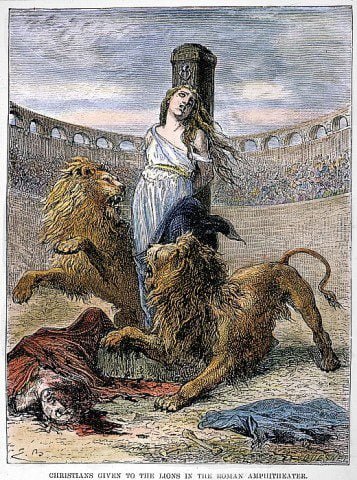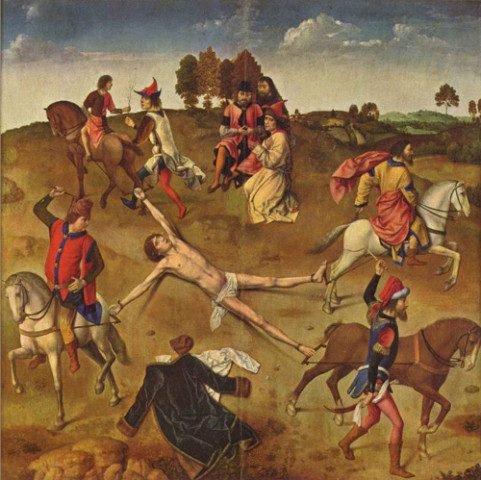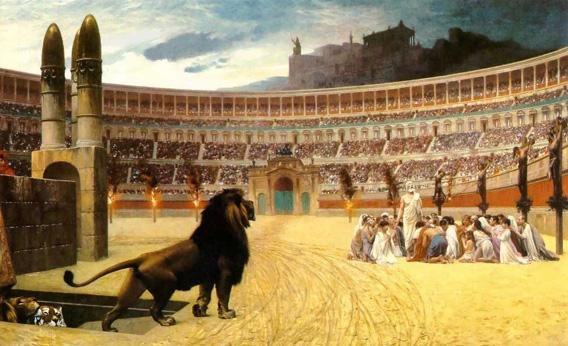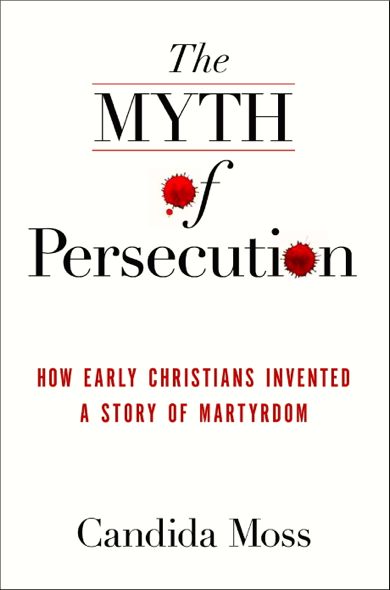
Christians in the Middle East are being persecuted for their faith. ISIS has slaughtered thousands of Christians and Muslims, all because they had the wrong religious belief. Shameless Evangelical preachers and right-wing politicians have used these killings as an opportunity to provoke fear in their followers. These preachers of fear live in a delusional world where being required to bake a cake for a gay couple or giving the same civil rights to LGBTQ people as to heterosexuals is the equivalent of having your head lopped off by ISIS. American Evangelical Christians have a persecution complex, stoked by horror stories about the atheist, secularist, humanistic, socialist horde taking over THEIR country. (Please see The Paranoia and Persecution Complex of the Religious Right.) With great mockery and ridicule, I laugh at American Christians who think they are being persecuted. Those who promote such things deserve the disdain dished out to them by both the religious and non-religious.
That said, the beheading of Christians in the Middle East has American Christians asking if they would be willing to suffer and die for the cause of Christ. Billy Watkins, a Christian and a writer for The Clarion-Ledger had this to say:
I can’t explain why.
Perhaps it doesn’t require an explanation.
But as the calendar quickly moved toward today — Easter Sunday — the more an image flashed in my mind: 20 Egyptian Christians and one other man, forced to their knees on a Mediterranean beach by members of ISIS on Feb. 15 and asked one by one if they believed in Jesus Christ.
Each answered yes, knowing the consequences.
All 21 were beheaded….
…It made me look inside myself, perhaps deeper than I’ve ever looked before.
It made me face the question: If I were in a similar situation, would I have the faith and the courage to look the ISIS cowards in the eye and say, “I believe in Jesus Christ.”
Knowing those would be the last words I ever said. Knowing the torture I was about to experience. Knowing my family and friends would grieve over my death. Knowing this life, which I can only comprehend as a struggling human, would end.
I would like to say yes, I would have the strength.
But do any of us really know until we are put in that situation?
To help me have some comparison for my struggle with this, I reached out to eight friends.
I asked them how they pictured themselves answering that question with a knife to their throats.
Some answered by email, others by Facebook message. Each provided food for thought. And I must commend them for digging deep inside their souls to help provide their answers.
One of the first I received: “This is very hard. I have tears. No, I am crying … I want to scream yes to those butchers. I believe in Jesus Christ!!!! But when I think of never seeing my husband, my family, my grandchildren, my grandchildren to come, I have to pause. More tears … ”
Friend No. 2 wrote, “I believe each Christian would always be ready to say, ‘Jesus Christ is my Lord and Savior.’ However, after watching two beheadings on YouTube, it gave me pause for thought. How could I possibly endure torture and a painful, slow death for my beliefs? My next thought was, ‘But that’s what Jesus did for me. Would he expect any less of me?’ ”
Friend No. 3: “There is a peace I believe God gives you in that situation. Just as Jesus prayed in the garden, twice, to let this cup pass from his wrath … I might say the same prayer, but in the end I would submit to God’s plan.”
Friend No. 4: “This is, of course, an impossible question to answer. Under the circumstances, I cannot imagine what I would do … it is always easier to sit in your living room and be convinced of your own virtues under the proposed circumstance. I also know I can rationalize decisions and I can waffle between what I want I know to be true … I could see this part of me rationalizing that it’s more important for me to live for any or all of the following …” My friend named his wife, children, extended family and church.
“I have so much to live for that lying to people who want to kill me is easily excused … (But) the scenario you describe is no time for rationalizing. It is a test … I hope I would get it … I want to be counted among those who would forgo this life for the better eternity to come.”
“Last point,” he wrote. “Hearing about the death of these 21 men has mattered to me — and not for the reason the killers wanted. It encourages me to live a life worthy of my calling. They died for Christ. May I at least live for him?”
Friend No. 5 wrote, “In facing a gruesome, wicked, evil death, my faith would still be in God. I hope and trust that such a painful ordeal would be ultimately redeemed and used by God for his purposes. Therefore, such a death is not in vain.”
Friend No. 6 was equally sure of his answer: “Faith is all you have left in that situation. To reject your faith would leave you with nothing — even if you lived. I can say unequivocally I would not reject my belief in Christ. If I did, I would be dead even though I lived. The other thing I know is that I would not die passively. I would fight with all my being. I would not let them dictate the terms of my death.”
Friend No. 7: “When you reach the most terrifyingly vulnerable moment of your life, you’re stripped to nothing but the things no can take away … the core beliefs that have driven every decision you’ve ever made. Ultimately, I would rather die outwardly professing my faith, with my death serving as a testament to those beliefs …
“But then I think of my child, of helping teach him those beliefs … If being a coward and lying to save my life means I’ll have the opportunity to raise a Godly man, so be it … Maybe this isn’t the right answer. But doing the right thing often means forgoing interests of the present so you can protect interests of the future.”
Friend No. 8: “Thomas Babington Macaulay wrote, ‘And how can a man die better than facing fearful odds, for the ashes of his fathers, and the temples of his Gods?’
“This world doesn’t afford many civilians the chance to die well for something that matters … it sounds cavalier, but I would be humbled and honored to be put in a situation where I had to choose between my life and the one thing that means most to me — my faith in Jesus Christ … I have a passion for this world, and ultimately the honestly amazing and blessed life that I’ve been given.
“I believe if he brings us to that place of choice, he gives us the grace to handle it if we remember that he is the ultimate source of everything … it’s not the end, it’s the beginning … let me go how he would take me, and let his will be done.”
This is what I believe: If I were put in that situation, I believe Jesus Christ would bathe me with a peace beyond human comprehension…
Those of us who were once Christians have asked the questions that Billy Watkins asks in his article. If it came to it, would we have been willing to die for Christ? Having grown up in a religious culture where persecution was touted as a sure sign of one’s faith, I had moments when I questioned whether I would stand up for Christ no matter what happened. Preaching on the street brought me into contact with people who wanted to do me bodily harm. One man deliberately aimed his truck at me, hoping to run me over. Over the corner curb he came, hoping to silence the Baptist street preacher. Fortunately, he missed.

In the Independent Fundamentalist Baptist (IFB) church, Foxe’s Book of Martyrs is required reading. Written in 1563 by John Foxe, the book is “a polemical account of the sufferings of Protestants under the Catholic Church, with particular emphasis on England and Scotland.” The first edition of the book was titled “Actes and Monuments of these Latter and Perillous Days, Touching Matters of the Church.”
Foxe’s Book of Martyrs is often used to prove that true Christians have always been persecuted for their faith. If the book was made into a movie, many modern-day Evangelicals would refuse to watch it due to its violence and gore.
The preface of the Christian Classics Ethereal Library edition of the book states:
After the Bible itself, no book so profoundly influenced early Protestant sentiment as the Book of Martyrs. Even in our time it is still a living force. It is more than a record of persecution. It is an arsenal of controversy, a storehouse of romance, as well as a source of edification.
These days, Foxe’s Book of Martyrs is not widely read outside of Evangelical, Baptist, Fundamentalist, Amish, and Mennonite circles. Part of the reason for this is because John Foxe’s credibility has been called into question. Wikipedia states:
The author’s credibility was challenged as soon as the book first appeared. Detractors accused Foxe of dealing falsely with the evidence, of misusing documents, and of telling partial truths. In every case that he could clarify, Foxe corrected errors in the second edition and third and fourth, final version (for him). In the early nineteenth century, the charges were taken up again by a number of authors, most importantly Samuel Roffey Maitland. Subsequently, Foxe was considered a poor historian, in mainstream reference works. The 1911 Encyclopædia Britannica accused Foxe of “wilful falsification of evidence”; two years later in the Catholic Encyclopedia, Francis Fortescue Urquhart wrote of the value of the documentary content and eyewitness reports, but claimed that Foxe “sometimes dishonestly mutilates his documents and is quite untrustworthy in his treatment of evidence”.
In contrast, J. F. Mozley maintained that Foxe preserved a high standard of honesty, arguing that Foxe’s method of using his sources “proclaims the honest man, the sincere seeker after truth. “The 2009 Encyclopædia Britannica notes that Foxe’s work is “factually detailed and preserves much firsthand material on the English Reformation unobtainable elsewhere.” It was typical, however, in the late nineteenth and early decades of the twentieth centuries to treat Foxe’s text as “not to be trusted….If not the father of lies, Foxe was thought to be the master of inventions, and so readers of the Encyclopedia [sic] Britannica were advised and warned.”
Foxe based his accounts of martyrs before the early modern period on previous writers, including Eusebius, Bede, Matthew Paris, and many others. He compiled an English martyrology from the period of the Lollards through to the persecution of Protestants by Mary I. Here Foxe had primary sources to draw on: episcopal registers, reports of trials, and the testimony of eyewitnesses. In the work of collection Foxe had Henry Bull as collaborator. The account of the Marian years is based on Robert Crowley’s 1559 extension of a 1549 chronicle history by Thomas Cooper, itself an extension of a work begun by Thomas Lanuet. Cooper (who became a Church of England Bishop) strongly objected to Crowley’s version of his history and soon issued two new “correct” editions. John Bale set Foxe onto martyrological writings and contributed to a substantial part of Foxe’s ideas as well as printed material.
Foxe’s book is in no sense an impartial account of the period. He did not hold to later centuries’ notions of neutrality or objectivity, but made unambiguous side glosses on his text, such as “Mark the apish pageants of these popelings” and “This answer smelleth of forging and crafty packing.” David Loades has suggested that Foxe’s history of the political situation, at least, is ‘remarkably objective’. He makes no attempt to make martyrs out of Wyatt and his followers, or anyone else who was executed for treason, except George Eagles, whom he describes as falsely accused.”
Sidney Lee, in the Dictionary of National Biography, called Foxe “a passionate advocate, ready to accept any primâ facie evidence”. Lee also listed some specific errors and suggested that John Foxe plagiarized. Thomas S. Freeman observes that, like a hypothetical barrister, Foxe had to deal with the evidence of what actually happened, evidence that he was rarely in a position to forge. But he would not present facts damaging to his client, and he had the skills that enabled him to arrange the evidence so as to make it conform to what he wanted it to say. Like the barrister, Foxe presents crucial evidence and tells a side of the story which must be heard, but his text should never be read uncritically, and his partisan objectives should always be kept in mind.”
By the end of the 17th century, however, the work tended to be abbreviated to include only ‘the most sensational episodes of torture and death’ thus giving to Foxe’s work ‘a lurid quality which was certainly far from the author’s intention’…
…Acts and Monuments was cannibalized for material to warn of the dangers of Papistry and, in Foxe’s name, also to undermine resurgent High Church Anglicanism. The author’s credibility and the text’s reliability became suspect, then, for both Catholic and Anglican Church defenders. Samuel Roffey Maitland, Richard Frederick Littledale as well as Robert Parsons and John Milner, mounted campaigns to disprove Foxe’s findings. Maitland’s and others’ critiques helped to awaken increasing antagonism toward intolerance in the public conscience. Combined with professionalized academic dissociation, left no voices to speak in Foxe’s defence, and reduced Foxe’s historical credibility such that “no one with any literary pretensions…ventured to quote Foxe as an authority.” John Milner, defender of the “old religion” (Catholicism), authored several tracts, pamphlets, essays, and Letters to the Editor: “Dear Sir…”; using all public means available to him for declaring that abuse of Englishmen was occurring “frequently”, ipso edem, the defamation and harassment of Catholics in England – a treatment not similarly visited on Sectarian communities or the Quakers.
Milner’s life project to discredit ‘Foxe’ was polemical—that was the point of arguing: to persuade people to see things as the speaker constructed or, at least, to seeing some merit to his case. Before the Houses of Parliament in the years of Milner’s and others activism, were bills for relieving English Catholics of tax penalties (for being Catholic), having to tithe to the Anglican Church, and relief from imposition of the Oath that stood between any Catholic and a government position.
While it is true that Christians throughout the 2,000-year history of the church have been martyred, it is also true that martyrdom stories have been grossly exaggerated, often little more than hagiography. Catholic scholar Candida Moss, former professor of New Testament and Early Christianity at the University of Notre Dame, took a careful look at early Christian martyr stories in her book The Myth of Persecution: How Early Christians Invented a Story of Martyrdom. (You can read my review of The Myth of Persecution here) Here’s an excerpt from my 2013 review:
…While Moss admits that Christians were persecuted on and off throughout the first 300 years of church history, she thoroughly debunks the claim that Christians were always persecuted. In fact, many of the instances of persecution were actually prosecutions…
…Throughout the book, Moss details how many of the source documents for the stories about Christian martyrs were embellished, and, at times, fabricated out of thin air. Even some of the saints revered by the Catholic church have histories that call into question their authenticity. I was quite surprised and delighted that Moss, a professor at a Catholic university, did not shy away from the controversies surrounding the mythic stories of the Catholic church.
Moss also details how some of the ancient martyr stories were actually borrowed from other cultures and religious traditions. There were times when I thought Moss was stretching these connections a bit, but I found the chapter, Borrowing of Jewish and Pagan Traditions, to be quite fascinating…
While Billy Watkins ponders whether he would be willing to lay his neck on the line for Jesus, I want to ponder the notion of a God who asks his followers to die for him. While most of us can readily understand dying for the sake of family or trying to help our fellow man, what are we to make of a religion and a God that puts great value on dying for one’s faith? While Christians will likely say that their martyrdom allows them to give a final testimony to God’s love and grace, I do wonder about a God who could save someone from having their head chopped off and does nothing. What would we think of a man who stood by while his wife or children were violently attacked and killed? Dying for one’s family is recognized by all to be a heroic act. But, dying for a religious belief? Wouldn’t lying and living be better than telling the truth and dying? Unlike the Muslim, the Christian martyr receives no special reward for dying. Why die when you can live?

At the heart of this discussion is the way Christians are conditioned to accept martyrdom. Church members are regaled with stories of Christians dying for their faith. Pastors preach inspiring sermons about the martyrdom stories in the Bible, complete with modern-day illustrations of Christians dying for their faith. Christians are reminded of the greatest martyr of all time, Jesus. If Jesus willingly died for us, shouldn’t we be willing to die for him? says the local Baptist preacher. And all God’s people said, AMEN!
I wonder if these stories would be enthusiastically believed if church members found out many of them are lies or half-truths? Pastors remind their flocks that True Christians® must be willing to die for their faith. These pro-martyrdom pastors subtly suggest that a person who cowers when faced with martyrdom should not expect forgiveness or a home in Heaven when they die. God is the giver and taker of life, and if he wants to have a Christian’s head lopped off, dare anyone object? The Apostle Paul made it clear that God has a right to do whatever he wants with the Christian’s life:
Nay but, O man, who art thou that repliest against God? Shall the thing formed say to him that formed it, Why hast thou made me thus? Hath not the potter power over the clay, of the same lump to make one vessel unto honour, and another unto dishonour? Romans 9:20-21
Well, I object. There is no religious belief worth dying for. I question what kind of God would do such a thing to someone he calls his child? I know I would do everything in my power to keep my partner, children, and grandchildren from being harmed, even if it meant losing my own life. It seems quite perverse to me for a God or a religion to ask or demand someone’s death just so the world can see their faith. Wouldn’t LIVING by faith be a better testimony than DYING for faith?
What I have written here should not be taken as a dismissal of the persecution many Middle Eastern Christians face on a daily basis. I abhor all such killing and fully support efforts to put an end to needless bloodshed. The goal should be for everyone, regardless of belief, to worship freely without the threat of harm or death. The children of Abraham — Christianity, Islam, and Judaism — have histories soaked in the blood of their followers. Perhaps it is time for them to quit trying to subjugate one another. Perhaps it is time to put an end to jihads, crusades, and holy wars. Two thousand years of bloodshed lead me to believe that there must be a better way. Perhaps it is time for peaceful co-existence, leaving it to God to settle matters after death.
As an atheist, I am greatly troubled to see people give their lives for a religious belief. Knowing that the God they are dying for doesn’t exist, I am pained to see them sacrifice everything for nothing. We should weep when we see the young offered up to God as sweet-smelling sacrifices. Is such a God worthy of worship? I think not. Life is worth living, even if it means, in the moment, lying about one’s faith. Christians need to reorder their importance list, moving God down the list behind family. If death comes in protection of one’s loved ones, so be it. But to die for a religious belief, to satisfy the blood lust of the Christian God? Can we even fathom such an abhorrent demand? I know I can’t.
But Bruce, you are not a Christian. How dare you tell Christians what should be important to them! I am not doing so. I am, however, asking them to question their belief in a God who demands his followers be willing to die for him. I am asking them to reconsider what it is that is most important to them. If Christians are still willing to die for their faith/God, fine. But they should not expect me to rejoice over their death or understand their motives.
Bruce Gerencser, 68, lives in rural Northwest Ohio with his wife of 47 years. He and his wife have six grown children and sixteen grandchildren. Bruce pastored Evangelical churches for twenty-five years in Ohio, Texas, and Michigan. Bruce left the ministry in 2005, and in 2008 he left Christianity. Bruce is now a humanist and an atheist.
Your comments are welcome and appreciated. All first-time comments are moderated. Please read the commenting rules before commenting.
You can email Bruce via the Contact Form.

